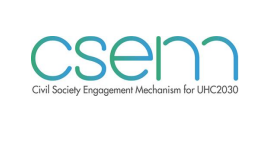UHC2030 hosted its annual UHC Day parliamentarian town hall to...
17 October 2018
Action and advocacy news from the UHC2030 Civil Society Engagement Mechanism (CSEM)

The past few months have been busy for the UHC2030 Civil Society Engagement Mechanism.
Creating momentum around a bold statement about primary health care, developing a joint letter with over 100 CSOs to WHO’s Director General Dr Tedros, and engaging with GAVI demonstrate just some of their dedication to achieving UHC.
Here are some select highlights:
In September, ahead of the 40th Anniversary of the Alma Ata Declaration, several civil society representatives called for a bold statement on the occasion of the Global Conference on Primary Health Care. CSEM led three rounds of open consultation on inputs into the statement, and received over 112 submissions. The Civil Society Statement – Global Health Conference launched on Thursday 25 October 2018, conveys civil society’s commitment to work more collaboratively, and most importantly, calls on governments to strengthen leadership and governance, improve financing, foster accountability, and lead solutions for comprehensive, community-based and patient-centered primary health care.
At the request of the leadership of Germany, Ghana and Norway, the World Health Organization (WHO) developed an initial Global Action Plan for Healthy Living and Well-being for All at All Ages to accelerate progress towards Sustainable Development Goal 3 (SDG3) at country level. CSEM wrote a letter, endorsed by 100 civil society organizations, to WHO Director-General Tedros recommending the inclusion of civil society in further development of the Global Action Plan. In response, WHO expressed its intention to establish a transparent system for engaging civil society throughout this initiative.
CSEM advocates for close collaboration between CSOs in UHC advocacy efforts, and is always open to contribute to discussion around improved cooperation of CSOs. At the Gavi CSO Constituency conference in Nairobi, Kenya, on September 12-14, 2018, CSEM Advisory Group (AG) member Rachel Ndirangu participated in a panel discussion on the importance of national, regional, and international collaboration between CSO platforms and Gavi. She encouraged civil society to adopt a common UHC agenda.
“We must lobby governments and different disease-specific funding agencies/mechanisms to be more accountable and support health systems strengthening approaches for developing integrated service delivery platforms that extend benefits and health outcomes for populations beyond the specific diseases,” she said. She added that Primary Health Care is key to the attainment of UHC. Participants pledged commitment to pool efforts in advocacy, social mobilization, and health system strengthening for greater impact. They jointly developed resources that the conference organizers will upload to their website.
At the United Nations General Assembly held in New York City in September, CSEM AG member Dr. Khuat Thi Hai Oanh participated on a multi-stakeholder panel during the high-level side meeting Putting Political Will into Action to End Tuberculosis (TB). She challenged decision-makers to work with communities to jointly lead strategies and actions to end TB, as “People living with TB have knowledge and know-how of their own that the politicians and the doctors may not understand.”
Dr. Oanh also addressed Heads of State at the High Level Meeting on Fighting TB where she argued that the people who are neglected by TB programs are also often left behind in other aspects of life. Countries need strong community systems that contribute to not only ending TB but also to achieving UHC and other sustainable development goals: “It is global solidarity that people we have left behind are diagnosed and successfully treated. It is global wisdom to engage with them, for global benefit. It is global responsibility to invest in community, now,” she urged. On September 26, at the high-level side event UHC Leaves No One Behind: working together towards good health and well-being for all, Dr. Oanh affirmed civil society's commitment to UHC, and called for increased investment in civil society and communities.
CSEM AG member Craig Burgess also emphasized community engagement at the 5th Health Systems Research Symposium in Liverpool, UK, from October 8-12, 2018 where he contributed to a panel during the launch of the UHC2030 International Health Partnership Statement on Sustainability and Transition from External Funding. “Transition from external funding and sustainability are not just about economies and economics. We need to facilitate active citizenship, and ensure full accountability to the people,” he said. Countries should partner with communities to track funding flows, promote budget transparency, build strong leadership from the bottom up, and guide targets according to context.
With the support of UHC2030, and in close collaboration with other civil society initiatives, CSEM will continue to advocate for UHC. This is particularly key ahead of the upcoming High Level Meeting on Universal Health Coverage scheduled for 2019. Upcoming advocacy moments, such as UHC Day 2018, will set the tone for this important meeting. Along with other stakeholders, CSEM is planning activities for this year’s UHC Day commemoration. Information will become available on the UHC2030 website soon.
About the CSEM
Representing an important constituency of the International Partnership for UHC 2030 (UHC2030), the Civil Society Engagement Mechanism (CSEM) raises civil society voices to ensure policies and programs for universal health coverage (UHC) are inclusive and equitable, with systematic attention to the most marginalized and vulnerable populations, so that no one is left behind. Through various platforms during September and October, CSEM members urged leaders to elevate civil society inclusion in key decision-making moments to realize UHC.
More UHC2030 News
A global health financing emergency threatens progress toward...
UHC2030 at HSR2024: Advancing equity and inclusion in health systems through civil society knowledge
UHC2030, in collaboration with the SUPPORT-SYSTEMS research...
